
Jamshad
Jamshad is a name of Persian origin, translating to 'a king' or 'sun.' It is predominantly used in Persian-speaking cultures and is recognized as both a royal and historical name. Traditionally male, Jamshad is significant in Persian mythology, associated with the legendary king Jamshid of the Shahnameh, the epic poem of the Persian poet Ferdowsi. This character is known for his wisdom, splendor, and his role in the development of culture and civilization.
The name carries a sense of nobility and strength, evoking a regal spirit. It is perceived positively, embodying symbolism of leadership and grandeur. It is easy to write and pronounce, contributing to its attractiveness as a baby name.
In Persian literature and culture, Jamshad stands out for its historical and cultural significance, making it a reverently chosen name for boys born into royal or noble families.
Basic Information
Gender: Boy
Sounds Like: JAM-shahd
Pronunciation Explanation: The first syllable 'JAM' is emphasized strongly, while the second syllable 'shahd' is pronounced gently.
Summary and Meaning
Meaning: king, sun (Persian)
Origin: The name Jamshad has Persian origins, prominent in Iranian culture and literature.
Usage: Jamshad is traditionally a masculine name, associated with male royalty in Persian culture.
Name Number (Chaldean)
Name Number (Pythagorean)
Popularity (Global Rank)
Overall: 43160
Boys: 45944
Most Popular in
Religious and Cultural Significance
Religion: Zoroastrianism
Background: In Zoroastrianism, Jamshad, associated with the myth of the sun and divine kingship, holds a notable place in the mythology of ancient Persia.
Cultural Significance: Throughout Persian history, the name Jamshad symbolizes strength, wisdom, and the glorious past of kingship, making it an appealing choice for parents valuing tradition.
Historical Significance: Jamshad is tied to ancient Persian legends, particularly within Ferdowsi's Shahnameh, where he is celebrated as a benevolent king who brought prosperity and knowledge to his people.
Popular Culture
Literature and Mythology: Jamshad is a central figure in the Shahnameh, representing the zenith of Iranian kingship and culture.
Movies and Television: Though not commonly depicted in contemporary media, the character of Jamshad and his legacy can be seen in various adaptations of the Shahnameh.
Feelings and Perceptions
Perception: Jamshad is viewed positively, evoking a sense of power, wisdom, and respect. It is associated with profound cultural heritage and regality.
Positive Feelings: Majestic, noble, powerful, wise, historical, respected.
Negative Feelings: May seem outdated or unfamiliar to non-Persian speakers.
Practical Considerations
Ease of Writing and Calling: The name Jamshad is fairly straightforward to write and pronounce. Comprising seven letters and two syllables, it strikes a balance between being memorable yet distinct.
Common Typos and Misspellings: Jamshad,Jamshed,Jamshhad,Jamsaad
Common Nicknames: Jam,Shad
Jamshad Popularity
Jamshad Usage and Popularity By Country
| Country | Rank (Overall) |
|---|---|
| Pakistan | 3045 |
| Qatar | 3434 |
| United Arab Emirates | 3873 |
| Bahrain | 4403 |
| Saudi Arabia | 4480 |
| Oman | 4748 |
| Iran | 10320 |
| Bangladesh | 14793 |
| India | 16160 |
| Hungary | 19137 |
Jamshad Usage and Popularity By City
| City | Rank (Overall) |
|---|---|
| Kozhikode | 589 |
| Malappuram | 513 |
| Calicut | 181 |
| Thrissur | 1532 |
| Palakkad | 611 |
| Lahore | 3028 |
| Bengaluru | 18805 |
| London | 29264 |
| Multan | 1427 |
| Chennai | 15510 |
Compatibility Analysis
Famous Persons Named Jamshad
No results found for Jamshad.
Related Names
Similar Sounding Names:
Jamshed,Jamir,Shad,Shahid